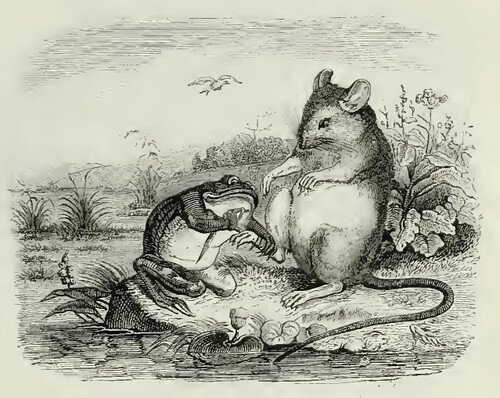HODIE: pridie Nonas Octobres (and yes, you can have your own Roman Google Calendar).
VERBUM HODIERNUM: Today's word is HOSTIS - read a brief essay about the word at the Verbosum blog. Here's one of the sayings you can find in the essay: Iram qui vincit, hostem superat maximum, "He who conquers anger overcomes his greatest enemy" (a very good saying for anyone prone to getting angry!).
MILLE FABULAE: New materials at the blog include more illustrated fables, such as Grandville's marvelous illustration for Rana et Mus, Amici (see below). This is also where you can download your free PDF copy of the Mille Fabulae et Una book. There have been over 2500 downloads of the book so far! Wow!
FABULAE FACILES: The new easy-to-read fable is Lupus et Pastorum Convivium, the story of the wolf's take on the shepherds feasting.
ENGLISH AESOP: Today's English fables are from Sir Roger L'Estrange, Wright's verse translation of La Fontaine and the limericks that accompany Walter Crane's illustrated Aesop.
TODAY'S MOTTOES & PROVERBS: Widgets available at SchoolhouseWidgets.com.
3-Word Mottoes: Today's 3-word motto is Semper spero meliora (English: I always hope for better things - although the Latin version sounds so much nicer!).
3-Word Proverbs: Today's 3-word proverb is Sola pecunia regnat (English: Money alone rules - a pretty fair assessment of Washington DC I would say!).
Rhyming Proverbs: Today's proverb with rhyme is: Cum contentus eris, dives tunc efficieris (English: When you will be content, then you will be rich - in other words: true wealth is a state of mind!).
Vulgate Verse: Today's verse is Non est homo qui non peccet. (II Chron. 6:36). For a translation, check out the polyglot Bible, in English, Hebrew, Latin and Greek, at the Sacred Texts Archive online.
Elizabethan Proverb Commentary: Here is today's proverb commentary, this time by Taverner: Nota res mala optima: An evill thinge knowen is best. It is good keping of a shrew that a man knoweth. For whan one is ones accustomed to a shrew or any other incommoditie, what so ever it be, it is no griefe. .
Today's Poem: Today's poem is from the wonderful epigrams of Owen (3.110), with a word list at NoDictionaries.com:
Sermones crebri morum sunt signa malorum.English: "Talking too much is a sign of bad character, for what need is there of words when you can see the deeds?" So true: deeds speak louder than words!
Nam quid opus verbis est, ubi facta vides?
Today's image is Grandville's wonderful mouse and frog that I mentioned above; the fable is on the long side, but worth it! 602. Rana et Mus, Amici. Muri, in ostio molendini residenti, supervenit rana et rogavit ut ipsam hospitio suo colligeret. Cui mus respondit benigne et apposuit ei farinam. Sed cum potus diu exspectatus non venit, rana, potibus assueta, tristis resedit. Muri dixit quod si secum vellet ad sua transire, ipsa sibi vicem reddere vellet. Sic venerunt ad fluvium et rana muri ait, “Hic transeunda est nobis aqua. Si fessus es, ego iuvabo te ne in aqua deficias; filum nobis alligabimus, tu in collo, et ego in pede meo.” Tunc rana, sponte se mergens, muri machinata est naufragium. Sed aquila forte aderat et murem unguibus arripit, similiter trahens ranam annexam, quae sic fertur locuta fuisse, “Qui socio suo parat opprobrium, non immerito cadit in laqueum.” (source)
